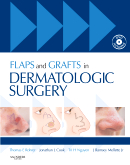|
|
|
| |
 |
|
|

|
 推薦指數:
推薦指數:





|
|
- 內容介紹
|
Flaps and Grafts in Dermatologic Surgery - Text with DVD
By Thomas E. Rohrer, MD, Jonathan L. Cook, MD and Tri H. Nguyen, MD
256 pages 804 ills
Trim size 11 X 8 1/2 in
Copyright 2009
Description
Authored by experts in the field, this brand-new reference presents a systematic approach to which flap or graft to use in which clinical situation and how to cut and move the skin. More than 350 full-color photographs and line drawings offer you step-by-step guidance. And, a DVD containing high-quality video clips demonstrates reconstructive procedures, including cutting, positioning, and suturing of flaps and grafts.
Reviews
"What makes the editors' approach so very unique is the inclusion of extensive high resolution narrated video to illustrate in detail the techniques described in the body of the text. This is a three-dimensional process, nearly duplicating the experience of standing shoulder to shoulder with a personal master instructor. The student is able to read the principles and applications and then see in real time the execution of the techniques. There is no better way to learn." --Leonard M Dzubow MD excerpt from foreword
Key Features
Includes numerous reconstructive options for each specific region of the face, and explains why one may be better than another in a given situation.
Features several chapters on the use of flaps and grafts in facial reconstruction and describes the finer points of their design, execution, and application.
Discusses complications and pitfalls and how to avoid them.
Devotes an entire chapter to facial anatomy with an emphasis on practical landmarks and danger areas.
Uses a consistent format throughout for ease of reference.
Table of Contents
Chapter 1: Anatomy
Introduction • Surface Landmarks and Surface Anatomy • The Aging Face • The Musculoaponeurotic System • Motor Nerves • Sensory Nerves of the Head and Neck • Vascular System • Special Structures: Lip, Eyelids, Nose, Ear
Chapter 2: Basic Principles in Flap Reconstruction
Basic Terminology • Flaps Defined by Blood Supply • Flap Physiology • Flap Biomechanics • Flaps Defined by Movement • Practical Points • Final Thoughts
Chapter 3: Primary Closure
Primary Closure Design and Considerations • Modifications or Variations • Applications and Disadvantages
Chapter 4: Advancement Flaps
Flap Design and Considerations • Flap Mobilization and Key Sutures • Flap Modifications and Applications • Disadvantages
Chapter 5: Rotation flaps
Rotation Flap Design: Basic Principles • Bilateral Rotation Flaps • Special Rotation Flaps • Plane of Flap Elevation and Surgical Undermining • Conclusion
Chapter 6: Island Pedicle Flaps
Closure • Complications
Chapter 7: Transposition Flaps
Flap Design and Considerations • Rhombic Flaps • Other Transposition Flaps • Complications • Conclusion
Chapter 8: Staged Interpolation Flaps
Paramedian Forehead Flap (PFF), Stage I • Paramedian Forehead Flap, Stage II • Cheek-to-Nose Interpolation Flap (CNIF) • Cheek-to-Nose Interpolation Flap, Stage II • Abbé (Lip-Switch) Flap • Abbé Flap, Stage II • Conclusion
Chapter 9: Skin Grafts
Full-Thickness Skin Grafts • Split-Thickness Skin Grafts • Conclusion • Graft Complication
Chapter 10: Scalp Reconstruction
Scalp Surgical Anatomy • Evaluation of the Scalp Defect • Basic Reconstruction Concepts • Second Intention Healing • Primary Closure • Split-Thickness Skin Grafts • Full-Thickness Skin Grafts • Random Pattern Cutaneous Flaps • Conclusion
Chapter 11: Forehead and Temple
Reconstructive Principles • Complications • Conclusions
Chapter 12: Periocular Reconstruction
Introduction • Periocular Anatomy • Preparation • Complications • General Principles of Periocular Reconstruction • Methods of Closure • Algorithmic Approach to Reconstruction by Periocular Subunits
Chapter 13: Cheek Reconstruction
Maximum Skin Tension Lines • Surface Anatomy • Skin Texture • Subcutaneous Anatomy • Which Reconstructive Procedure • Flaps by Cheek Region • Complications • Conclusion
Chapter 14: Ear Reconstruction
Introduction • Ear Aesthetics • Embryology • Topography • General Principles • Skin Grafts • Adjacent Tissue Transfer • Cartilage • Regional Reconstruction • Prosthetics and When to Refer
Chapter 15: Reconstruction of the Nose
Introduction • Reconstructive Options • Complications • Conclusion
Chapter 16: Perioral Reconstruction
Introduction • General Principals of Lip Reconstruction • Reconstruction
Chapter 17: The Neck
Preoperative Considerations • Relevant Anatomy • Reconstructive Options • Regional Pearls • Summary
|
|
|

